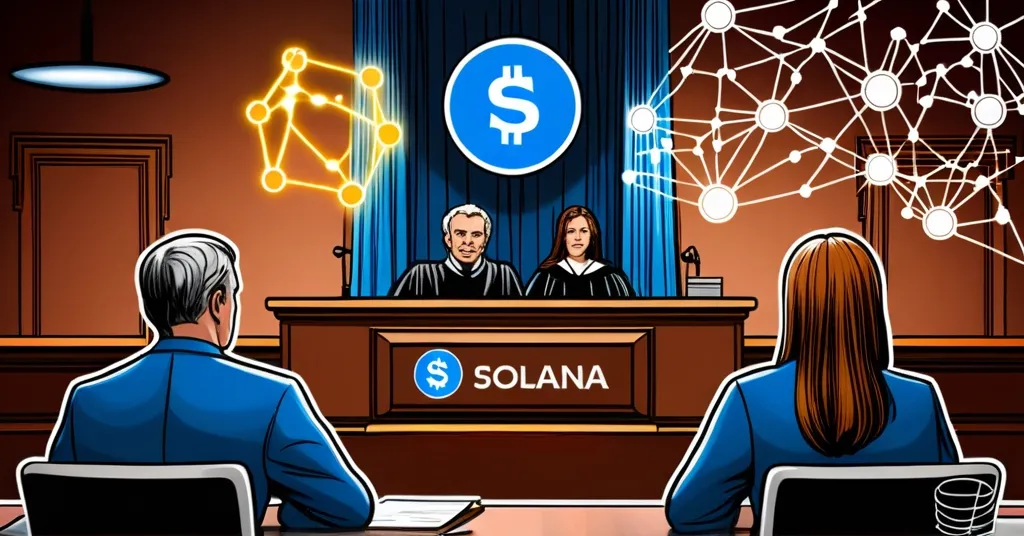Solana Co-Founder Sued by Ex-Wife Over Alleged Staking Reward Theft

Solana Co-Founder Faces Lawsuit Over Alleged Staking Reward Misappropriation
Stephen Akridge, a co-founder of Solana, is embroiled in a lawsuit with his ex-wife, Elisa Rossi, who accuses him of misappropriating her staking rewards. This case highlights the personal and financial complexities within the crypto world.
- Lawsuit filed by Elisa Rossi against Stephen Akridge
- Alleged misappropriation of staking rewards
- Solana’s price and market performance
- Technical issues and reliability concerns
In a twist that could be straight out of a crypto thriller, Stephen Akridge, a co-founder of the blockchain platform Solana, finds himself in a legal battle with his ex-wife, Elisa Rossi. She accuses him of using his deep technical knowledge to siphon off her staking rewards, a move that adds a personal drama to Solana’s already tumultuous journey in the crypto world.
The legal tussle, filed in the San Francisco Superior Court, hinges on Rossi’s claim that Akridge, during their ten-year marriage, diverted “significant” sums of money from her Solana token staking into his own pockets. Staking, in simple terms, is like earning interest on a savings account, but with cryptocurrency. You lock up your tokens to help validate transactions on the blockchain network, and in return, you earn new tokens as rewards. Rossi alleges that Akridge, with his insider knowledge, manipulated this process to her disadvantage.
While the exact figures remain redacted, Rossi’s claims shed light on the financial complexities and potential pitfalls of crypto staking, especially when intertwined with personal relationships. This case is set against the backdrop of Solana’s recent performance, with its price hovering around $241 in December 2024, boasting a market cap over $90 billion and a total value locked (TVL, the total amount of assets locked in DeFi projects) of $9.35 billion.
Despite this recovery, Solana has not been without its controversies. The platform has faced frequent technical outages, raising questions about its reliability and stability. These issues, coupled with its association with the FTX collapse, have painted a challenging picture for the blockchain known for its high transaction speed and potential in decentralized finance (DeFi) and non-fungible tokens (NFTs).
Akridge, who served as a principal engineer at Solana alongside co-founders Anatoly Yakovenko and Raj Gokal, has since moved on to become the CEO of Cyber Grant Inc. His role in developing Solana’s technology is now under scrutiny as he faces these serious allegations from his ex-wife.
The personal and financial stakes highlighted by this lawsuit underscore the broader narrative of blockchain technologies like Solana. While they promise innovation and disruption, they also bring complexities and risks that individuals must navigate carefully. As we champion the ideals of decentralization and privacy, this saga serves as a reminder of the importance of transparency and accountability in the wild west of cryptocurrency.
In the world of crypto, it’s not just the blockchain that can get tangled—sometimes it’s the personal lives of its founders too. Despite the challenges, Solana remains a beacon of innovation in the blockchain space, pushing boundaries and fostering new possibilities in finance and beyond.
Some argue that this lawsuit could actually benefit Solana by forcing it to address transparency issues head-on. It’s a stark reminder that the promise of financial freedom and innovation in the crypto world can sometimes be muddied by personal disputes and technical hurdles. But hey, if there’s one thing the crypto community is good at, it’s turning adversity into opportunity.
Rossi says Akridge used his deep technical knowledge of the blockchain to siphon the profits from her Solana holdings.
The exact amount of money in dispute isn’t clear, as portions of the lawsuit have been redacted. But Rossi has called the sums as ‘significant.’
Here are some key takeaways and questions:
- What is the lawsuit about?
The lawsuit involves Stephen Akridge, a co-founder of Solana, being accused by his ex-wife, Elisa Rossi, of diverting her staking rewards from Solana tokens into his own pockets.
- What is crypto staking?
Crypto staking is like earning interest on a savings account, but with cryptocurrency. You lock up your tokens to help validate transactions on a blockchain network, earning new tokens as rewards.
- How has Solana performed recently?
Solana has seen a significant price recovery, reaching around $241 in December 2024, with a market cap over $90 billion and a total value locked (TVL) of $9.35 billion in DeFi projects.
- What are the concerns about Solana’s reliability?
Solana has experienced frequent technical outages, raising concerns about its reliability despite its growth in popularity among developers and investors.
- Who are the key players involved in this lawsuit?
The key players are Stephen Akridge, the defendant and co-founder of Solana, and Elisa Rossi, his ex-wife and the plaintiff in the lawsuit.
- What role did Stephen Akridge play at Solana?
Stephen Akridge was a principal engineer at Solana, working closely with co-founders Anatoly Yakovenko and Raj Gokal to develop the blockchain.
This saga serves as a cautionary tale for those diving into the crypto waters, where the promise of financial freedom and innovation can sometimes be muddied by personal disputes and technical hurdles. As we continue to champion the ideals of decentralization and privacy, stories like these remind us of the importance of transparency and accountability in the wild west of cryptocurrency. Share your thoughts on the legal and ethical implications of this case in the comments below.



